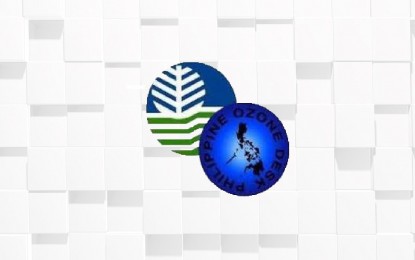
MANILA – The window of opportunity is getting smaller for the Philippines to phase down, with less difficulty, the nationwide importation and use of hydrofluorocarbons (HFCs), which are substances that have high global warming potential.
The nationwide HFC phase-down will already start in 2024 but the country would not be able to avail of international support for this undertaking without first ratifying the Montreal Protocol on Substances that Deplete the Ozone Layer’s Kigali Amendment, noted Philippine Ozone Desk (POD) project evaluation and monitoring officer Onofre Escota.
POD was created under the Environmental Management Bureau (EMB) of the Department of Environment and Natural Resources to facilitate and coordinate projects and policies for the phase out of Ozone Depleting Substances (ODS).
“Under the protocol, there’s multilateral technical and funding assistance for the undertaking so our country might as well avail of this support since we must phase down HFCs,” he said.
Ratifying the Kigali Amendment will enable the country to access such support, he said.
The Montreal Protocol is an international environmental agreement on protecting Earth’s ozone layer from depletion by eliminating use of ozone-depleting substances (ODS) like hydrochlorofluorocarbons (HCFCs) used in refrigeration and other applications.
The Kigali Amendment aims to help boost the global fight against climate change by requiring Montreal Protocol parties to gradually phase down production and use of HFCs.
Experts said the phase-down is necessary as HFCs are non-ODS alternatives to HCFCs but help warm Earth, contributing to climate change’s onslaught.
Escota said the Philippines is a Montreal Protocol signatory so the country is already phasing out HCFCs.
He added that being a Montreal Protocol signatory means the country still has the obligation to phase down HFCs even without ratifying the Kigali Amendment.
“Phasing down HFCs will be more difficult to undertake without support like technical and funding assistance which the protocol provides,” he said, explaining why the Philippines must ratify the amendment.
The 1985 discovery of a hole in the ozone layer fueled international action on the matter, including the crafting of the Montreal Protocol.
It raised urgency for industry alternatives that would prevent further depletion of the ozone layer, noting this shield in the upper atmosphere absorbs much of the sun’s harmful ultraviolet rays.
However, it clarified that such alternatives must not further increase global warming.
POD continues to seek ratification of the Kigali Amendment, by meeting with government agencies concerned to discuss the matter. Among these agencies are the health, transportation, trade and energy departments.
Escota said POD is still awaiting such agencies' respective certificates of concurrence supporting Philippine ratification of the Kigali Amendment, hopefully this year.
He said the environment secretary will endorse to the Department of Foreign Affairs (DFA) the agencies' respective certificates of concurrence for transmittal to Office of the President, which, in turn, will forward these to the Senate.
Escota hopes government can finish the ratification process before the Philippines starts phasing down HFCs.
"There's no deadline for ratifying Kigali Amendment but it's best for us to do so before HFC phase-down in our country begins," he said. (PNA)
